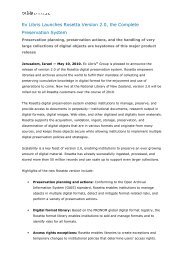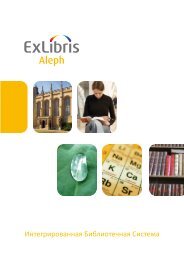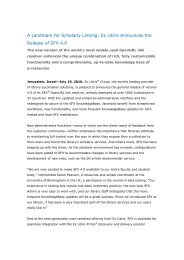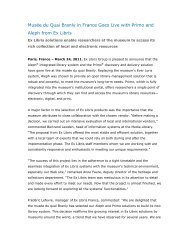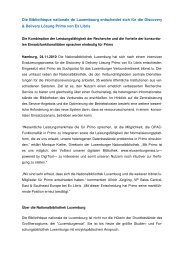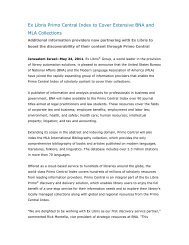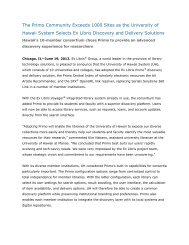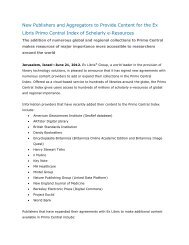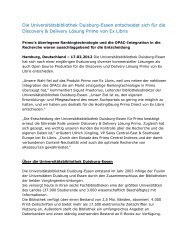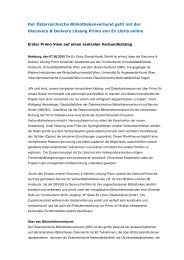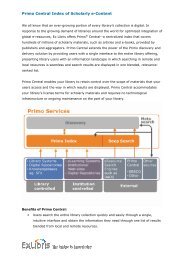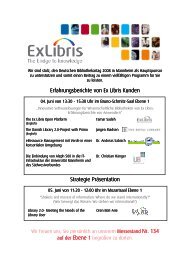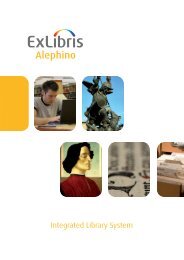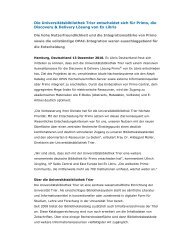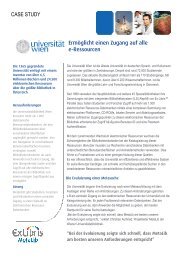April 2005 Issue - Ex Libris
April 2005 Issue - Ex Libris
April 2005 Issue - Ex Libris
Create successful ePaper yourself
Turn your PDF publications into a flip-book with our unique Google optimized e-Paper software.
Remote storage facilities<br />
The sheer quantity of materials held by national libraries<br />
requires the storage of some items in off-site, remote storage<br />
facilities. Once transferred to the remote storage facility, the<br />
library is often challenged by the need to supply a specific<br />
item to a patron at a set time. The ALEPH 500 closed stack and<br />
off-site materials storage functionality assists national library<br />
staff in providing patrons with items they require, to the<br />
requested reading room in a timely fashion.<br />
After the patron has placed an items request, the ALEPH 500<br />
materials paging utility identifies the exact location of the item<br />
and—if it is stored in a remote facility—the closest van pickup<br />
time and date. An interface that interacts with depository<br />
management software transfers information about requested<br />
items and provides users with immediate feedback regarding<br />
availability and the time that their requested item will be delivered<br />
to the library, and to their preferred reading room. A systemgenerated<br />
paging slip prompts staff to pull the requested material<br />
and transfer it to the designated pickup location.<br />
National libraries are generally closed-stack institutions, a fact<br />
that may potentially create a problem for patrons who would<br />
like to use an item continuously rather than one time. A special<br />
Reading Room functionality, originally developed by <strong>Ex</strong> <strong>Libris</strong><br />
for the Royal Library of Sweden, alleviates this difficulty. Upon<br />
requesting a specific item, patrons are presented with a pulldown<br />
menu offering a choice of the Reading Rooms in which<br />
the item can be used. Once the request is processed, the<br />
system automatically assigns the items to the patron who has<br />
ordered it and changes its location to that of the selected<br />
reading room. From this point, the item is available to the<br />
patron, in the selected reading room, for a library-designated<br />
period of time. After each use, the patron returns the item to<br />
the librarian responsible for the reading room. The item is<br />
returned to closed stacks after the library-specified period of<br />
time has elapsed.<br />
As national libraries materials are generally not permitted<br />
to be removed from the premises, patrons often request<br />
that a photocopy of all or part of a required document be<br />
provided them. Sophisticated, library-defined Document<br />
Delivery functionalities enable staff to process these requests<br />
easily. Document Delivery requests can be made directly by<br />
patrons from the ALPEH 500 Web OPAC or by staff in the<br />
Windows client. As soon as a patron photocopy request has<br />
been made, a print request or pull slip can be generated<br />
and printed at the appropriate circulation desk. Patrons can<br />
be billed according to the paper size used for the<br />
photocopies after which the copies can be delivered to a<br />
particular location or held for patron pickup. Photocopy<br />
requests can be deleted after the requested document or<br />
portion has been printed.<br />
- 12 -<br />
Portals for National Libraries<br />
National libraries are typically also very much engaged in<br />
providing Web access to the broad subject area of local<br />
language, history and culture. Through the library, access is<br />
provided to a wide range of Web-accessible material including<br />
the catalogues of the library’s own holdings, to databases and<br />
e-journals under license, to electronic full content stored<br />
locally, to digitized image material, to Web expositions, and<br />
to much other informative material. With this diversity it is<br />
necessary to manage a wide range of access controls, search<br />
mechanisms and linking facilities. Such infrastructure should<br />
be of no concern however to the audiences that a national<br />
library attracts over the Web: the general public but also<br />
students and researchers. Each should experience easy search<br />
and access.<br />
The Koninlijke Biblioteek (KB) in the Netherlands, the National<br />
Library of the Czech Republic, and the National Library of<br />
Finland represent some of the national libraries who have<br />
selected MetaLib as their library portal.<br />
For the KB MetaLib and SFX offer a portal product and dynamic<br />
linking solution with which it can begin to realize its goals of<br />
hiding digital library complexities for the very diverse audience<br />
that they serve. MetaLib has been integrated in the KB Web<br />
site by giving it the same look and feel and by using the<br />
MetaLib “deep linking” capabilities to link directly to MetaLib<br />
search results from a search box on the library’s home page.<br />
The KB patrons can easily navigate between the library’s home<br />
page and MetaLib. The MetaLib QuickSearch feature, the<br />
default entry point at the KB, is being used effectively to<br />
provide searching in predefined lists of resources of general<br />
relevance to Dutch language, history and culture. The merged,<br />
ranked and deduplicated search results support a general<br />
audience.<br />
The KB staff believes that modules like MetaSearch, the MetaLib<br />
resource discovery tools, and the personalization features are<br />
more applicable to the specialized needs of students and<br />
researchers. The KB staff will undertake further evaluation to<br />
refine their assumptions and to better assess the effectiveness<br />
of the way MetaLib is customized and integrated into their<br />
local environment.<br />
The library staff at the National Library of the Czech Republic<br />
have written and presented extensively on their deployment<br />
of MetaLib and SFX. For a comprehensive description of the<br />
MetaLib implementation at the Czech National Library which<br />
received the INFORUM 2002 AWARD, given to the most<br />
important Czech and Slovak products, services or acts<br />
related to electronic information resources, see<br />
http://www.inforum.cz/inforum2002/english/ceny.htm<br />
For further details on the Finnish National Portal, see<br />
http://www.lib.helsinki.fi/finelib/english/



